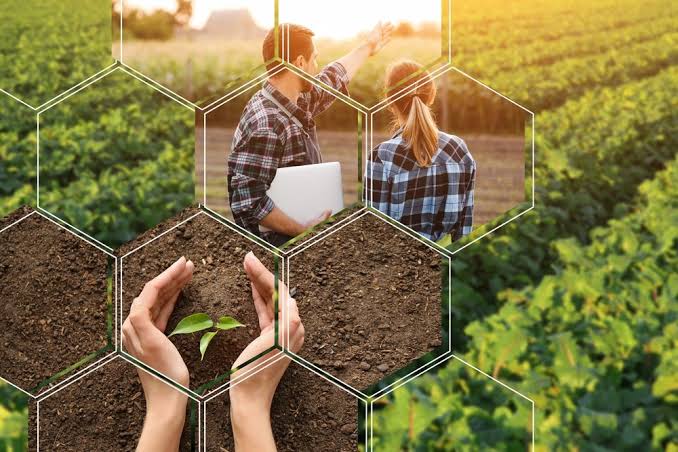Agronomy is the study of crops and how to grow them successfully. It involves understanding the science behind plant cultivation and finding ways to optimize crop production. Farmers and agronomists work together to ensure that fields yield healthy and abundant harvests.
In agronomy, soil plays a crucial role. Good soil is essential for plant growth. Agronomists analyze soil properties such as texture, structure, and nutrient content to determine its fertility. They recommend suitable fertilizers to enhance soil nutrients, ensuring the crops receive the necessary elements for robust development.
Crop rotation is a common practice in agronomy. Farmers rotate different crops in a field over time to maintain soil fertility and prevent the buildup of pests and diseases. This sustainable approach helps preserve the health of the land while maximizing crop yield.
Weather patterns significantly impact agronomy. Agronomists closely monitor climate conditions to predict potential challenges like droughts or excessive rainfall. This information guides farmers in making informed decisions on when to plant and harvest, contributing to better crop management.
Water management is another crucial aspect of agronomy. Efficient irrigation systems help provide crops with the right amount of water. Agronomists assess the water needs of different crops, considering factors like soil type and climate, to ensure optimal growth without wasting resources.
Pest and weed control are ongoing concerns in agronomy. Agronomists study the life cycles of pests and weeds to develop effective strategies for their management. This may involve the use of pesticides or integrated pest management techniques that minimize environmental impact.
Advancements in technology have significantly influenced modern agronomy. Precision farming, for example, utilizes satellite imagery and sensors to precisely monitor and manage crop fields. This technology allows farmers to optimize resource use, reduce waste, and increase overall efficiency.
Agronomy extends beyond the farm, encompassing research and education. Agricultural scientists conduct experiments to improve crop varieties, enhance resistance to diseases, and increase overall productivity. Agronomy education equips future farmers and agronomists with the knowledge and skills needed to address evolving challenges in agriculture.
In addition, agronomy is a multidisciplinary field that combines science, technology, and practical knowledge to ensure sustainable and productive crop production. It is a dynamic field that continues to evolve as new technologies and research findings shape the way we approach agriculture.
However, soil conservation is a key concern in agronomy. Erosion and soil degradation can have detrimental effects on agricultural land. Agronomists work on implementing conservation practices such as contour plowing, cover cropping, and terracing to protect the soil structure and prevent nutrient loss.
Crop physiology is another aspect that agronomists delve into. Understanding how plants respond to different environmental conditions helps in optimizing growth. This includes studying factors like photosynthesis, respiration, and flowering patterns to enhance crop performance.
Agronomy also encompasses the utilization of organic farming practices. Farmers and agronomists increasingly explore methods that minimize synthetic inputs, focusing on natural alternatives and sustainable practices. This approach aims to reduce environmental impact while maintaining high-quality crop yields.
The concept of agroecology is gaining prominence in agronomy. This approach emphasizes the integration of ecological principles into agricultural systems. It seeks to create harmonious relationships between crops, livestock, and the environment, fostering a more resilient and sustainable farming ecosystem.
Global issues, such as food security, are at the forefront of agronomic considerations. Agronomists work on developing strategies to ensure that enough food is produced to meet the growing demands of a rising global population. This involves exploring innovative farming techniques, improving crop varieties, and addressing issues related to distribution and access.
Agronomy extends its reach to socioeconomic aspects, recognizing the impact of agriculture on communities. It involves assessing the economic viability of different farming practices, considering factors like market demand, pricing, and the cost of production. This holistic approach helps farmers make decisions that not only benefit their crops but also contribute to the overall well-being of the community.
In addition, agronomy is a comprehensive field that goes beyond the mere act of growing crops. It encompasses a wide range of disciplines and considerations, from soil health to technological advancements, and from ecological principles to socioeconomic factors. As our understanding of agriculture deepens and new challenges emerge, agronomy continues to play a vital role in shaping the future of sustainable and productive food production.
Read Also: All You Need To Know About The Pitbull Terrier Dog Breed
Importance of Agronomy in Agriculture

The importance of agronomy cannot be overstated, as it serves as the backbone of global food production. Here are key aspects highlighting its significance:
1. Food Security: Agronomy is fundamental to ensuring a stable and sufficient food supply. By optimizing crop production and implementing sustainable practices, agronomy contributes directly to global food security, addressing the challenge of feeding a growing population.
2. Economic Stability: Agriculture is a cornerstone of many economies worldwide. Agronomy plays a pivotal role in enhancing the economic stability of farming communities by improving crop yields, reducing production costs, and exploring market opportunities. This, in turn, positively impacts the overall economic health of a region or country.
3. Sustainable Resource Management: Agronomy promotes sustainable practices that aim to conserve natural resources such as soil, water, and biodiversity. By minimizing environmental impact and optimizing resource use, agronomy helps ensure the longevity and resilience of agricultural systems.
4. Environmental Conservation: Through soil conservation techniques, responsible pesticide use, and sustainable farming practices, agronomy contributes to environmental conservation. Preserving soil quality, preventing erosion, and minimizing chemical runoff are vital for maintaining ecological balance and safeguarding ecosystems.
5. Technological Advancements: Agronomy drives technological innovations in agriculture. From precision farming technologies to genetically modified crops, advancements in agronomy contribute to increased efficiency, reduced waste, and improved resilience against environmental challenges.
6. Climate Resilience: Agronomy plays a critical role in addressing the impacts of climate change on agriculture. By studying weather patterns, developing drought-resistant crops, and implementing adaptive strategies, agronomy helps farmers mitigate the risks associated with a changing climate.
7. Rural Development: Agronomy contributes to the overall development of rural communities. By providing farmers with knowledge and tools to enhance their agricultural practices, agronomy empowers communities, fostering self-sufficiency and improving living standards.
8. Scientific Research: Agronomy is at the forefront of scientific research in agriculture. Ongoing studies in crop physiology, genetics, and sustainable farming practices contribute to a deeper understanding of plant biology and lead to innovations that benefit the entire agricultural sector.
However, agronomy is vital for ensuring a balance between agricultural productivity, economic prosperity, and environmental sustainability. Its interdisciplinary nature allows it to address complex challenges facing agriculture, making it an essential field for the well-being of societies globally.
Socioeconomic Impact of Agronomy
The socioeconomic impact of agronomy is multifaceted and extends beyond the boundaries of agricultural fields. Here are key considerations:
1. Economic Stability: Agronomy plays a crucial role in stabilizing economies by enhancing agricultural productivity. Increased crop yields and efficient farming practices contribute to economic growth, providing a stable foundation for rural and national economies.
2. Livelihoods and Employment: Agriculture, influenced by agronomic practices, is a significant source of employment globally. Improved farming methods create more job opportunities, supporting livelihoods in rural communities and contributing to poverty reduction.
3. Market Dynamics: Agronomy influences market dynamics by optimizing crop production. Understanding market demands, pricing strategies, and supply chain efficiency are integral to the economic success of farmers and the agricultural sector as a whole.
4. Rural Development: The application of agronomic knowledge empowers rural communities. Farmers equipped with sustainable practices and modern agricultural techniques are better positioned for self-sufficiency, leading to overall rural development.
5. Income Inequality: Agronomy interventions can address income inequality by improving the economic conditions of small-scale farmers. Access to knowledge, resources, and technology enables marginalized farmers to enhance their productivity and income.
6. Technological Adoption: The integration of technology in agronomy enhances productivity and economic outcomes. Farmers adopting modern agricultural technologies contribute to economic advancements and foster innovation within the agricultural sector.
7. Access to Resources: Agronomy emphasizes responsible resource management. Ensuring equitable access to resources such as land, water, and technology helps in reducing disparities and promoting a fair distribution of agricultural benefits.
8. Food Prices and Accessibility: Agronomic practices influence the supply of food in markets, affecting food prices and accessibility. Sustainable and efficient farming contributes to a stable food supply, which has direct implications for food affordability and availability.
9. Investment Opportunities: Advances in agronomy create investment opportunities in the agriculture sector. Innovations, research, and sustainable practices attract investments that further stimulate economic growth and development.
10. Social Well-being: The socioeconomic impact of agronomy extends to social well-being. Improved agricultural practices contribute to food security, reducing malnutrition and enhancing the overall health and quality of life in communities.
In essence, agronomy serves as a linchpin for socioeconomic development, connecting agricultural practices to broader economic and social outcomes. The application of sound agronomic principles can lead to more prosperous and resilient communities.
Read Also: Cocker Spaniel Dog Breed: Description, Health, Origin and More
Research and Innovation

This ongoing pursuit of knowledge plays a pivotal role in shaping the future of global agriculture:
1. Scientific Advancements: Agronomy drives research in plant science, genetics, and physiology, leading to breakthroughs in understanding crop biology and improving plant varieties for better yields and resilience.
2. Precision Farming Technologies: Ongoing research in agronomy has paved the way for precision farming, utilizing technologies like GPS, sensors, and data analytics to optimize resource use, reduce waste, and increase overall farm efficiency.
3. Sustainable Agriculture Practices: Research in agronomy focuses on developing and promoting sustainable farming practices. This includes exploring organic farming methods, cover cropping, and agroecological approaches to minimize environmental impact.
4. Crop Biotechnology: Agronomy plays a crucial role in crop biotechnology research, including genetic modification for improved pest resistance, drought tolerance, and nutritional content, contributing to the development of genetically modified organisms (GMOs).
5. Climate-Smart Agriculture: Research in agronomy addresses climate change challenges through the development of climate-smart agriculture. This involves strategies to adapt crops to changing climate conditions, minimize greenhouse gas emissions, and enhance overall climate resilience.
6. Soil Health and Microbiology: Ongoing studies explore the intricate relationship between soil health and crop productivity. Research in agronomy delves into soil microbiology, nutrient cycling, and microbial interactions to optimize soil conditions.
7. Digital Agriculture: Agronomy embraces digital innovations, including farm management software, remote sensing, and drones. These technologies aid in data-driven decision-making, allowing farmers to optimize crop management and resource allocation.
8. Water-Efficient Technologies: Research in agronomy addresses water scarcity challenges by developing water-efficient technologies such as drip irrigation and moisture sensors, ensuring optimal water use in agriculture.
9. Integrated Pest Management (IPM): Agronomy research contributes to the development of integrated pest management strategies, combining biological control, cultural practices, and judicious use of pesticides to minimize the impact on the environment.
10. Resilient Crop Varieties: Agronomic research focuses on developing crop varieties with increased resilience to pests, diseases, and adverse environmental conditions, ensuring a more stable and reliable food supply.
11. Knowledge Transfer and Extension Services: Agronomy research extends to knowledge dissemination and extension services, ensuring that the latest scientific findings reach farmers, promoting the adoption of innovative practices on the ground.
12. Sustainable Resource Management: Research in agronomy aims to find solutions for sustainable resource management, addressing challenges related to soil degradation, water quality, and biodiversity conservation in agricultural landscapes.
In conclusion, research and innovation in agronomy continually push the boundaries of agricultural knowledge, leading to advancements that enhance the efficiency, sustainability, and resilience of farming systems.
Read Also: Aims and Objectives of Agriculture Department

